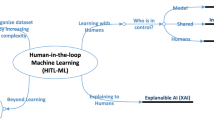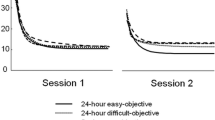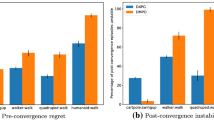Abstract
Individual learning (IL) and observational learning are both important for humans to acquire information. Observational learning consists of action-only observational learning (AL) and action-outcome observational learning (AOL). Heterogeneous results have been found in previous research on comparing these three kinds of learning (IL, AL and AOL), as a result of different paradigms. The current study was to seperate and compare the learning processes of the three learning styles with an adapted the two-arm bandit paradigm, and notably to propose a new computing mechanism based on reinforcement learning (RL) rules for AL. We also focused on the effect of the skill of demonstrators to distinguish the applicable situation of our new model, in which demonstrator’s action preference was regarded as the inferred outcome to drive the learning processes in AL condition. Results showed that: a. With more information, IL and AOL led to better learning performance than AL; b. In skilled demonstrator group, apparent action preference in AL can make up for the decline in learning performance and confidence. Importantly, the new computational model explaining AL won only when the demonstrator was skilled, indicating learners adapted their learning strategies in different situations.




Similar content being viewed by others
Data availability
The datasets generated during and/or analysed during the current study are available from the corresponding author on reasonable request.
References
Akaike, H. (1973). Information theory and an extension of the maximum likelihood principle. In B. N. Petrov & F. Caski (Eds.), Proceedings of the Second International Symposium on Information Theory (pp. 267–281). Akademiai Kiado. https://doi.org/10.1007/978-1-4612-1694-0_15
Bandura, A. (1978). Social learning theory of aggression. The Journal of Communication, 28(3), 12–29. https://doi.org/10.1111/j.1460-2466.1978.tb01621.x
Bandura, A. (2008). Observational learning. The International Encyclopedia of Communication. https://doi.org/10.1002/9781405186407.wbieco004
Behrens, T. E., Hunt, L. T., Woolrich, M. W., & Rushworth, M. F. (2008). Associative learning of social value. Nature, 456(7219), 245–249. https://doi.org/10.1038/nature07538
Bellebaum, C., & Colosio, M. (2014). From feedback- to response-based performance monitoring in active and observational learning. Journal of Cognitive Neuroscience, 26(9), 2111–2127. https://doi.org/10.1162/jocn_a_00612
Bellebaum, C., Jokisch, D., Gizewski, E. R., Forsting, M., & Daum, I. (2012a). The neural coding of expected and unexpected monetary performance outcomes: Dissociations between active and observational learning. Behavioural Brain Research, 227(1), 241–251. https://doi.org/10.1016/j.bbr.2011.10.042
Bellebaum, C., Rustemeier, M., & Daum, I. (2012b). Positivity effect in healthy aging in observational but not active feedback-learning. Neuropsychology, Development, and Cognition. Section B, Aging, Neuropsychology and Cognition, 19(3), 402–420. https://doi.org/10.1080/13825585.2011.629289
Brainard, D. H. (1997). The psychophysics toolbox. Spatial Vision, 10(4), 433–436. https://doi.org/10.1163/156856897X00357
Burke, C. J., Tobler, P. N., Baddeley, M., & Schultz, W. (2010). Neural mechanisms of observational learning. Proceedings of the National Academy of Sciences of the United States of America, 107(32), 14431–14436. https://doi.org/10.1073/pnas.1003111107
Burke, C. J., Baddeley, M., Tobler, P. N., & Schultz, W. (2016). Partial adaptation of obtained and observed value signals preserves information about gains and losses. Journal of Neuroscience, 36(39), 10016–10025. https://doi.org/10.1523/JNEUROSCI.0487-16.2016
Charpentier, C. J., Iigaya, K., & O’Doherty, J. P. (2020). A neuro-computational account of arbitration between choice imitation and goal emulation during human observational learning. Neuron, 106(4), 687-699 e687. https://doi.org/10.1016/j.neuron.2020.02.028
Daunizeau, J., Adam, V., & Rigoux, L. (2014). VBA: A probabilistic treatment of nonlinear models for neurobiological and behavioural data. PLoS Computational Biology, 10(1), e1003441. https://doi.org/10.1371/journal.pcbi.1003441
Daw, N. D., Gershman, S. J., Seymour, B., Dayan, P., & Dolan, R. J. (2011). Model-based influences on humans’ choices and striatal prediction errors. Neuron, 69(6), 1204–1215. https://doi.org/10.1016/j.neuron.2011.02.027
FeldmanHall, O., & Shenhav, A. (2019). Resolving uncertainty in a social world. Nature Human Behaviour, 3(5), 426–435. https://doi.org/10.1038/s41562-019-0590-x
Gagne, R. M. (1970). The conditions of learning. Holt.
Grabenhorst, F., Baez-Mendoza, R., Genest, W., Deco, G., & Schultz, W. (2019). Primate Amygdala neurons simulate decision processes of social partners. Cell, 177(4), 986-998 e915. https://doi.org/10.1016/j.cell.2019.02.042
Kang, P., Burke, C. J., Tobler, P. N., & Hein, G. (2021). Why we learn less from observing outgroups. Journal of Neuroscience, 41(1), 144–152. https://doi.org/10.1523/Jneurosci.0926-20.2020
Kleiner, M. B., Brainard, D. H., Pelli, D. G., Ingling, A., & Broussard, C. (2007). What’s new in psychtoolbox-3? Perception, 36(2), 301–307.
Kobza, S., & Bellebaum, C. (2015). Processing of action- but not stimulus-related prediction errors differs between active and observational feedback learning. Neuropsychologia, 66, 75–87. https://doi.org/10.1016/j.neuropsychologia.2014.10.036
Kobza, S., Ferrea, S., Schnitzler, A., Pollok, B., Sudmeyer, M., & Bellebaum, C. (2012). Dissociation between active and observational learning from positive and negative feedback in Parkinsonism. PLoS ONE, 7(11), e50250. https://doi.org/10.1371/journal.pone.0050250
Köhler, W., & Winter, E. (2018). The mentality of apes. Routledge.
Konovalov, A., Hu, J., & Ruff, C. C. (2018). Neurocomputational approaches to social behavior. Current Opinion in Psychology, 24, 41–47. https://doi.org/10.1016/j.copsyc.2018.04.009
Lindstrom, B., & Olsson, A. (2015). Mechanisms of social avoidance learning can explain the emergence of adaptive and arbitrary behavioral traditions in humans. Journal of Experimental Psychology: General, 144(3), 688–703. https://doi.org/10.1037/xge0000071
Lockwood, P. L., & Klein-Flugge, M. (2020). Computational modelling of social cognition and behaviour-a reinforcement learning primer. Social Cognitive and Affective Neuroscience. https://doi.org/10.1093/scan/nsaa040
Ma, D. S., Correll, J., & Wittenbrink, B. (2015). The Chicago face database: A free stimulus set of faces and norming data. Behavior Research Methods, 47(4), 1122–1135. https://doi.org/10.3758/s13428-014-0532-5
Maier, N. R. F. (1930). Reasoning in humans. I. On direction. Journal of Comparative Psychology, 10(2), 115.
Najar, A., Bonnet, E., Bahrami, B., & Palminteri, S. (2020). The actions of others act as a pseudo-reward to drive imitation in the context of social reinforcement learning. PLoS Biology, 18(12), e3001028. https://doi.org/10.1371/journal.pbio.3001028
Olsson, A., Knapska, E., & Lindstrom, B. (2020). The neural and computational systems of social learning. Nature Reviews Neuroscience, 21(4), 197–212. https://doi.org/10.1038/s41583-020-0276-4
Pelli, D. G. (1997). The VideoToolbox software for visual psychophysics: Transforming numbers into movies. Spatial Vision, 10(4), 437–442. https://doi.org/10.1163/156856897X00366
Rodriguez Buritica, J. M., Eppinger, B., Schuck, N. W., Heekeren, H. R., & Li, S. C. (2016). Electrophysiological correlates of observational learning in children. Developmental Science, 19(5), 699–709. https://doi.org/10.1111/desc.12317
Safra, L., Chevallier, C., & Palminteri, S. (2019). Depressive symptoms are associated with blunted reward learning in social contexts. PLoS Computational Biology, 15(7), e1007224. https://doi.org/10.1371/journal.pcbi.1007224
Schwarz, G. (1978). Estimating the dimension of a model. The Annals of Statistics, 6(2), 461–464. https://doi.org/10.1214/aos/1176344136
Selbing, I., Lindstrom, B., & Olsson, A. (2014). Demonstrator skill modulates observational aversive learning. Cognition, 133(1), 128–139. https://doi.org/10.1016/j.cognition.2014.06.010
Selbing, I., & Olsson, A. (2017). Beliefs about others’ abilities alter learning from observation. Scientific Reports, 7(1). https://doi.org/10.1038/s41598-017-16307-3
Vostroknutov, A., Polonio, L., & Coricelli, G. (2018). The role of intelligence in social learning. Science and Reports, 8(1), 6896. https://doi.org/10.1038/s41598-018-25289-9
Yifrah, B., Ramaty, A., Morris, G., & Mendelsohn, A. (2021). Individual differences in experienced and observational decision-making illuminate interactions between reinforcement learning and declarative memory. Science and Reports, 11(1), 5899. https://doi.org/10.1038/s41598-021-85322-2
Zhang, L., Lengersdorff, L., Mikus, N., Glascher, J., & Lamm, C. (2020). Using reinforcement learning models in social neuroscience: Frameworks, pitfalls and suggestions of best practices. Social Cognitive and Affective Neuroscience, 15(6), 695–707. https://doi.org/10.1093/scan/nsaa089
Acknowledgements
The authors would like to acknowledge those participants taking part in the study.
Funding
This work was supported by the Program for National Natural Science Foundation of China (31970982; 3217019).
Author information
Authors and Affiliations
Contributions
Y.X. and C.Q. designed the experiment and wrote the first draft of the manuscript; Y.X. and W.G collected and analyzed the data and performed the model-based analyses. All authors commented and reviewed the manuscript. Y.X. and G.J.H revised the manuscript based on the comments. All authors read and approved the final manuscript.
Corresponding authors
Ethics declarations
Ethics approval
The methodology for this study was approved by the Human Research Ethics committee of South China Normal University. (SCNU-PSY-2020–3-020).
Consent to participate/publish
Informed consent was obtained from all individual participants included in the study.
Conflicts of interest/competing interests
The authors have no financial or proprietary interests in any material discussed in this article.
Additional information
Publisher's note
Springer Nature remains neutral with regard to jurisdictional claims in published maps and institutional affiliations.
Rights and permissions
Springer Nature or its licensor (e.g. a society or other partner) holds exclusive rights to this article under a publishing agreement with the author(s) or other rightsholder(s); author self-archiving of the accepted manuscript version of this article is solely governed by the terms of such publishing agreement and applicable law.
About this article
Cite this article
Xu, Y., Guo, W., Huang, G. et al. Adaptive learning strategies in purely observational learning. Curr Psychol 42, 27593–27605 (2023). https://doi.org/10.1007/s12144-022-03904-3
Accepted:
Published:
Issue Date:
DOI: https://doi.org/10.1007/s12144-022-03904-3




